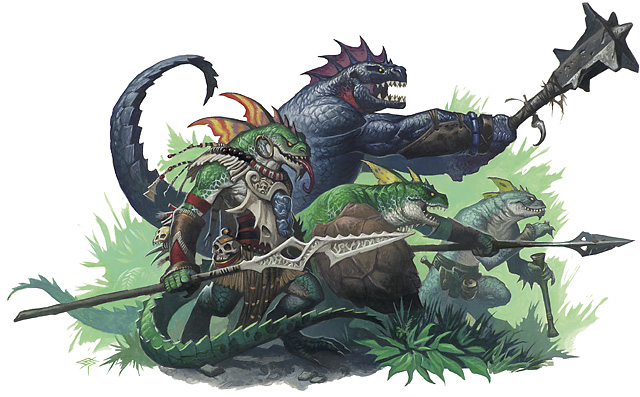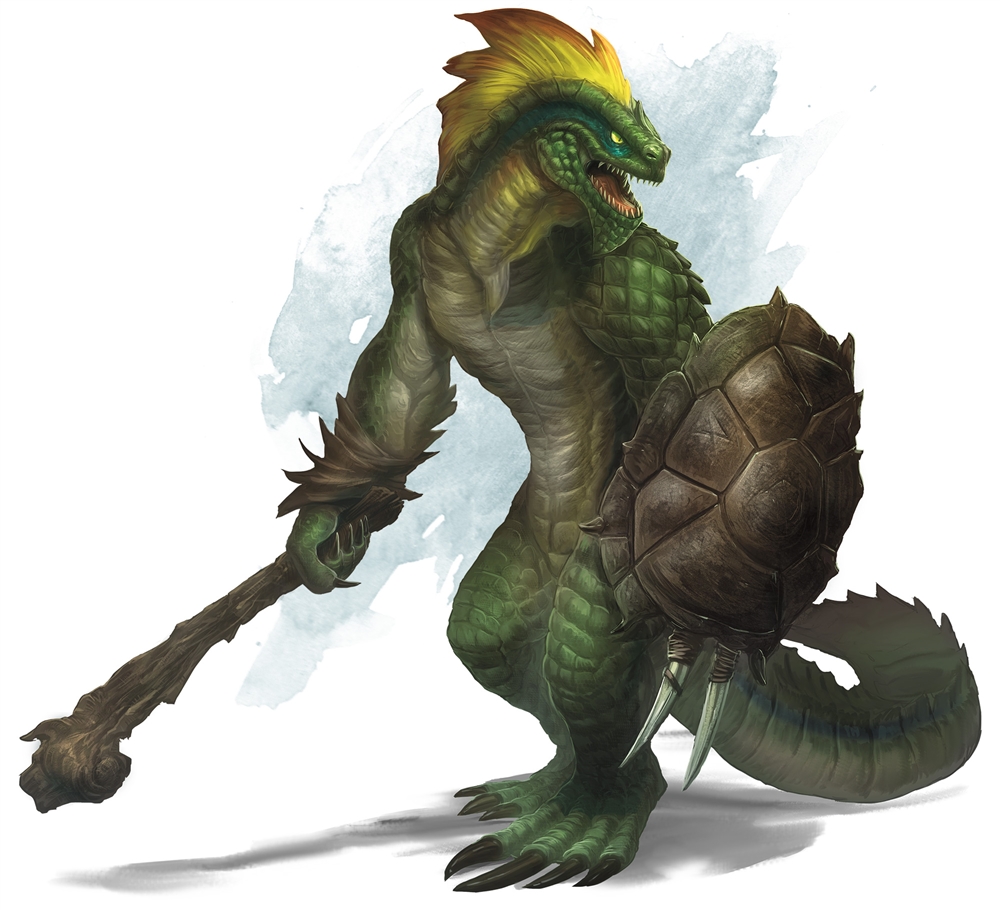Lizardfolk
Only a fool looks at the lizardfolk and sees nothing more than scaly humanoids. Their physical shape notwithstanding, lizardfolk have more in common with iguanas or dragons than they do with humans, dwarves, or elves. Lizardfolk possess an alien and inscrutable mindset, their desires and thoughts driven by a different set of basic principles than those of warm-blooded creatures. Their dismal swamp homes might lie hundreds of miles from the nearest human settlement, but the gap between their way of thinking and that of the smooth-skins is far greater. Despite their alien outlook, some lizardfolk make an effort to understand and, in their own manner, befriend people of other races. Such lizardfolk make faithful and skilled allies.
Alien Minds
The lizardfolk's reptilian nature comes through not only in their appearance, but also in how they think and act. Lizardfolk experience a more limited emotional life than other humanoids. Like most reptiles, their feelings largely revolve around fear, aggression, and pleasure. Lizardfolk experience most feelings as detached descriptions of creatures and situations.
For example, humans confronted by an angry troll experience fear on a basic level. Their limbs shake, their thinking becomes panicked and jumbled, and they react by instinct. The emotion of fear takes hold and controls their actions. In contrast, lizardfolk see emotions as traits assigned to other creatures, objects, and situations. A lizardfolk doesn't think, "I'm scared." Instead, aggressive, stronger creatures register to the lizardfolk as fearsome beings to be avoided if possible. If such creatures attack, lizardfolk flee, fighting only if cornered.
Lizardfolk aren't scared of a troll; instead, they understand that a troll is a fearsome, dangerous creature and react accordingly. Lizardfolk never become angry in the way others do, but they act with aggression toward creatures that they could defeat in a fight and that can't be dealt with in some other manner. They are aggressive toward prey they want to eat, creatures that want to harm them, and so on. Pleasurable people and things make life easier for lizardfolk.
Pleasurable things should be preserved and protected, sometimes at the cost of the lizardfolk's own safety. The most pleasurable creatures and things are ones that allow lizardfolk to assess more situations as benign rather than fearsome.
Cold and Calculating
Most humanoids describe cold-blooded people as lacking in emotion and empathy. The same label serves as an apt depiction of lizardfolk. Lacking any internal emotional reactions, lizardfolk behave in a distant manner. They don't mourn fallen comrades or rage against their enemies. They simply observe and react as a situation warrants. Lizardfolk lack meaningful emotional ties to the past. They assess situations based on their current and future utility and importance. Nowhere does this come through as strongly as when lizardfolk deal with the dead.
To a lizardfolk, a comrade who dies becomes a potential source of food. That companion might have once been a warrior or hunter, but now the body is just freshly killed meat. A lizard folk who lives among other humanoids can, over time, learn to respect other creatures' emotions. The lizardfolk doesn't share those feelings, but instead assesses them in the same clinical manner. Yes, the fallen dwarf might be most useful as a meal, but hacking the body into steaks provokes aggression in the other humanoids and makes them less helpful in battle.
Utility and Survival
The lizardfolk mindset might seem unnecessarily cruel, but it helps them survive in a hostile environment. The swamps they inhabit are filled with a staggering variety of threats. Lizardfolk focus on survival above all, without sentiment. Lizardfolk assess everyone and everything in terms of utility. Art and beauty have little meaning for them. A sharp sword serves a useful and good purpose, while a dull sword is a dead weight without a whetstone.
Lizardfolk see little need to plan more than a season or so into the future. This approach allows them to maintain their current level of influence in the world, but it limits their growth. Lizardfolk have no interest in developing writing, making long-term plans, or cultivating other methods to progress beyond their simpie existence as hunters and gatherers.
Hapless Soft Ones
At their core, lizardfolk view other humanoids with an indifference verging on pity. Born into the world lacking stout scales and sharp teeth, it's a wonder they have managed to survive for so long. The typical human would barely make it through a day in the swamps.
Still, if other creatures prove useful to lizardfolk, those creatures can trigger a protective response made all the stronger by their apparent weakness. The lizardfolk assess such beings as hatchlings, young ones incapable of protecting themselves but who might prove useful in the future if they receive care.
Civilization and Culture
Naming Traditions
Lizardfolk take their names from the Draconic language. They use simple descriptives granted by the tribe based on an individual's notable deeds or actions. For example, Garurt translates as "axe," a name given to a lizardfolk warrior who defeated an ore and claimed his foe's weapon. A lizardfolk who likes to hide in a stand of reeds before ambushing an animal might be called Achuak, which means "green" to describe how she blends into the foliage.
Lizardfolk make no distinction between male and female in their naming conventions. Each example name includes its translation in parenthesis.
Major Language Groups and Dialects
Lizardfolk can master Common, but their mindset results in a speech pattern distinct from other humanoids. Lizardfolk rarely use metaphors. Their speech is almost always literal. They might pick up idioms, but only with some difficulty. Names confuse them, unless they are descriptive. They tend to apply their own naming conventions to other creatures using Common words. Lizardfolk use active verbs to describe the world. A lizardfolk in cold weather might say, "This wind brings cold" rather than "·I feel cold." Lizardfolk tend to define things In terms of actions, rather than effects.
RPG Datasheet
Your lizardfolk character has the following racial traits.
Ability Score Increase. Your Constitution score increases by 2, and your Wisdom score increases by 1.
Age. Lizardfolk reach maturity arqund age 14 and rarely live longer than 60 years.
Alignment. Most lizardfolk are neutral. They see the world as a place of predators and prey, where life and death are natural processes. They wish only to survive, and prefer to leave other creatures to their own devices.
Size. Lizardfolk are a little bulkier and taller than humans, and their colorful frills make them appear even larger. Your size is Medium.
Speed. Your base walking speed is 30 feet, and you have a swimming speed of 30 feet.
Bite. Your fanged maw is a natural weapon, which you can use to make unarmed strikes. If you hit with it, you deal piercing damage equal to 1d6 + your Strength modifier, instead of the bludgeoning damage normal for an unarmed strike.
Cunning Artisan. As part of a short rest, you can harvest bone and hide from a slain beast, construct, dragon, monstrosity, or plant creature of size Small or larger to create one of the following items: a shield, a club, a javelin, or 1d4 darts or blowgun needles. To use this trait, you need a blade, such as a dagger, or appropriate artisan's tools, such as leatherworker's tools.
Hold Breath. You can hold your breath for up to 15 minutes at a time.
Hunter's Lore. You gain proficiency with two of the following skills of your choice: Animal Handling, Nature, Perception, Stealth, and Survival.
Natural Armor. You have tough, scaly skin. When you aren't wearing armor, your AC is 13 + your Dexterity modifier. You can use your natural armor to determine your AC if the armor you wear would leave you with a lower AC. A shield's benefits apply as normal while you use your natural armor.
Hungry Jaws. In battle, you can throw yourself into a vicious feeding frenzy. As a bonus action, you can make a special attack with your bite. If the attack hits, it deals its normal damage, and you gain temporary hit points (minimum of 1) equal to your Constitution modifier, and you can't use this trait again until you finish a short or long rest.
Languages. You can speak, read, and write Common and Draconic.




